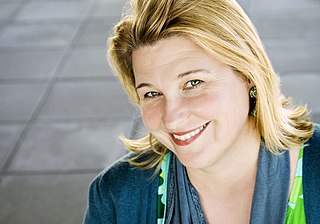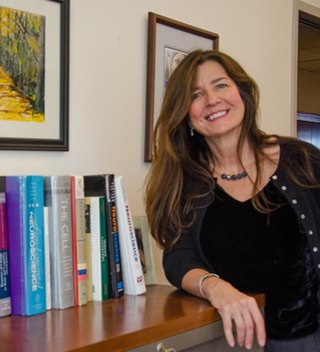
Nancy Gail Kanwisher FBA is the Walter A Rosenblith Professor of Cognitive Neuroscience in the Department of Brain and Cognitive Sciences at the Massachusetts Institute of Technology and an investigator at the McGovern Institute for Brain Research. She studies the neural and cognitive mechanisms underlying human visual perception and cognition.

Lisa Feldman Barrett is a University Distinguished Professor of psychology at Northeastern University, where she focuses on affective science. She is a director of the Interdisciplinary Affective Science Laboratory. Along with James Russell, she is the founding editor-in-chief of the journal Emotion Review. Along with James Gross, she founded the Society for Affective Science.

John Terrence Cacioppo was the Tiffany and Margaret Blake Distinguished Service Professor at the University of Chicago. He founded the University of Chicago Center for Cognitive and Social Neuroscience and was the director of the Arete Initiative of the Office of the Vice President for Research and National Laboratories at the University of Chicago. He co-founded the field of social neuroscience and was member of the department of psychology, department of psychiatry and behavioral neuroscience, and the college until his death in March 2018.

Stephen W. Porges is an American psychologist and neuroscientist. He is the Professor of Psychiatry at the University of North Carolina at Chapel Hill. Porges is also currently Director of the Kinsey Institute Traumatic Stress Research Consortium at Indiana University Bloomington, which studies trauma. He was previously a professor at the University of Illinois, Chicago, where he was director of the Brain-Body Center at the College of Medicine, and at the University of Maryland.

Eve Marder is a University Professor and the Victor and Gwendolyn Beinfield Professor of Neuroscience at Brandeis University. At Brandeis, Marder is also a member of the Volen National Center for Complex Systems. Dr. Marder is known for her pioneering work on small neuronal networks which her team has interrogated via a combination of complementary experimental and theoretical techniques.

Helen J. Neville was a Canadian psychologist and neuroscientist known internationally for her research in the field of human brain development.
The Troland Research Awards are an annual prize given by the United States National Academy of Sciences to two researchers in recognition of psychological research on the relationship between consciousness and the physical world. The areas where these award funds are to be spent include but are not limited to areas of experimental psychology, the topics of sensation, perception, motivation, emotion, learning, memory, cognition, language, and action. The award preference is given to experimental work with a quantitative approach or experimental research seeking physiological explanations.

Tania Singer is a German psychologist and social neuroscientist and the scientific director of the Max Planck Society's Social Neuroscience Lab in Berlin, Germany. Between 2007 and 2010, she became the inaugural chair of social neuroscience and neuroeconomics at the University of Zurich and was the co-director of the Laboratory for Social and Neural Systems Research in Zurich. Her research focuses on the developmental, neuronal, and hormonal mechanisms underlying human social behavior and social emotions such as compassion and empathy. She is founder and principal investigator of the ReSource project, one of the largest longitudinal studies on the effects of mental training on brain plasticity as well as mental and physical health, co-funded by the European Research Council. She also collaborates with the macro-economist Dennis Snower on research on caring economics. Singer's Caring Economics: Conversations on Altruism and Compassion, Between Scientists, Economists, and the Dalai Lama was published in 2015. She is the daughter of the neuroscientist Wolf Singer.
David Amodio is an American scientist who examines the psychological and neural mechanisms underlying social behavior, with a focus on self-regulation and intergroup relations. Amodio is known for his role in developing the field of social neuroscience and for his neuroscientific approach to social psychology.
Elizabeth Kensinger is Professor of Psychology and Neuroscience at Boston College. She is known for her research on emotion and memory over the human lifespan. She is co-author of the book Why We Forget and How To Remember Better: The Science Behind Memory, published in 2023 by Oxford University Press, which provides an overview of the psychology and neuroscience of memory. She also is the author of the book Emotional Memory Across the Adult Lifespan, which describes the selectivity of memory, i.e., how events infused with personal significance and emotion are much more memorable than nonemotional events. This book provides an overview of research on the cognitive and neural mechanisms underlying the formation and retrieval of emotional memories. Kensinger is co-author of a third book How Does Emotion Affect Attention and Memory? Attentional Capture, Tunnel Memory, and the Implications for Posttraumatic Stress Disorder with Katherine Mickley Steinmetz, which highlights the roles of emotion in determining what people pay attention to and later remember.

Wendy Suzuki is a Professor of Neuroscience and Psychology at the New York University Center for Neural Science and popular science communicator. She is the author of Healthy Brain, Happy Life: A Personal Program to Activate Your Brain and Do Everything Better. Since September 1, 2022, she has served as Dean of the New York University College of Arts & Science.
Adriana Galván is an American psychologist and expert on adolescent brain development. She is a professor of psychology at the University of California, Los Angeles (UCLA) where she directs the Developmental Neuroscience laboratory. She was appointed the Jeffrey Wenzel Term Chair in Behavioral Neuroscience and the Dean of Undergraduate Education at UCLA.
Marlene R. Cohen is a neuroscientist at the University of Pittsburgh and an Associate Director of the Center for the Neural Basis of Cognition, a joint venture between the University of Pittsburgh and Carnegie Mellon University. Her team investigates how visual information is encoded in groups of neurons and used to guide behavior. She is recognized for pioneering use of multielectrode array recording to determine that the improved behavioral performance associated with redirecting spatial attention has a neural correlate in the brain that is reflected by reduced correlated activity between neurons. Cohen has also demonstrated that this same mechanism happens during learning. She has received several awards for her work, including the Troland Research Award from the National Academy of Sciences in 2018
Catherine Hartley is an American psychologist and an Associate Professor of Psychology within the Department of Psychology and Center for Neural Science at New York University in New York City. Hartley's research explores how brain development impacts the evaluation of negative experiences, decision-making, and motivated behavior. Her work has helped to elucidate how uncontrollable aversive events affect fear learning and how learning to control aversive stimuli can improve emotional resilience.

BJ Casey is an American psychologist and expert on adolescent brain development and self control. She is a professor of Psychology and Affiliated Professor of the Justice Collaboratory and Interdepartmental Neuroscience Program at Yale University where she directs the Fundamentals of the Adolescent Brain (FAB) Lab.
Yael Niv is a neuroscientist who studies human and animal reinforcement learning and decision making. She is Professor of Psychology and Neuroscience at Princeton University. Niv is known for her research contributions and for her visible advocacy work fighting against gender bias in neuroscience. Niv is founder of biaswatchneuro.com, a website that tracks statistics in an effort to combat sexism in science.
Kristen A. Lindquist is a psychologist and affective neuroscientist whose research focuses on language, emotions, and culture. Lindquist is known for her work on emotion words, suggesting that when speakers of different languages talk about common emotions like love, they may not mean the same thing. Her findings run counter to the view that there are universal emotions that are experienced the same across cultures. Lindquist is Associate Professor of Psychology and Neuroscience and Director of Carolina Affective Science Lab at the University of North Carolina, Chapel Hill.
Michael Joshua Frank is a neuroscientist who has played a leading role in emerging field of computational psychiatry. He is currently the Edgar L. Marston Professor of Cognitive, Linguistic and Psychological Sciences at Brown University and Director of the Center for Computational Brain Science at Brown's Carney Institute for Brain Science. Other honors include: Kavli Fellow (2016), the Cognitive Neuroscience Society Young Investigator Award (2011), and the Janet T Spence Award for early career transformative contributions.

Aikaterini Fotopoulou is a psychologist and cognitive neuroscientist who is a professor at the University College London Research Department of Clinical, Educational and Health Psychology. She is the co-founder and current board member of the International Association for the Study of Affective Touch and the European Cognitive and Affective Neuroscience Society, a Fellow of the Association for Psychological Sciences and past co-chair of its International Convention, and the current President of the Psychology Section of the British Science Association. Fotopoulou was the past Director of the London Neuropsychoanalysis Centre, Secretary of the International Neuropsychoanalysis Society and coordinator of the London Neuropsychoanalysis Group.
Nim Tottenham is a professor of psychology at Columbia University, where she leads the Developmental Affective Neuroscience Laboratory. Her research highlighted fundamental changes in amygdala-prefrontal cortex circuitry across childhood and adolescence and the influential role of early experiences on the developmental trajectories of these circuits.









